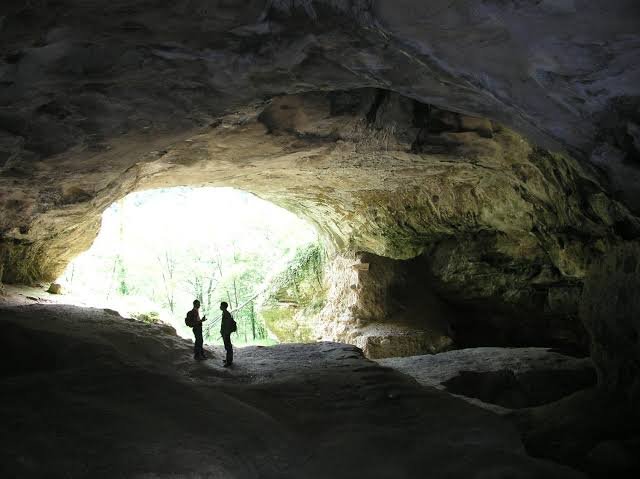
source
It was sundown when our party reached the mouth of the great cave, The Skulls. We could see the sprawling sky above us patiently swallowing up the red ball of the sun, while thousands of birds, obviously retiring to their nests, hovered brilliantly in the distance. It was a thrilling spectacle, indeed.
Sir Pau and I, overshadowed by the lust for gold and treasures, had led a party of ten young men to the great cave - where we hoped to harvest abandoned treasure that would make us forever wealthy.
So, our mission was simple and straightforward - to either harvest as much treasures as we could and become lavishly rich or we perish in the cave while trying. It was our belief that it was better to die than to live in perpetual peasantry and penury .
Before Sir Pau and I left Texas and decided to visit The Skulls, we had heard a lot about it - how, being the ancient site for burying Ethiopian princes, it was rich in gold and other valuable treasures of the fourteenth century.
However, there was a general belief, among the Ethiopian locals especially, that nobody could enter the great cave and return alive. A popular story was told about a British adventurer who, about a century ago, travelled down to Ethiopia in search of lost treasures. It was said that he entered the cave with about twenty of his servants but none of them returned alive.
Well, Pau and I were not the kind of men that would shiver because of stories that lacked empirical evidence. We repayment with death was not yet due and, moreover, we remained resolute and unwavering in our pursuit for treasures, for gold, for money and glory. We had come prepared, prepared for whatever demons that were trapped within the walls of the ancient cave.
"It is awesome to be here at last, Dan," Pau pulled his white beards, laughing thinly at me. "The treasures will be within our grasp in a few moments."
"Yes, Pau," said I, staring at my revolver, the revolver that would pierce the skull of any rude demon should we gain access into the cave. "We will clench the jaws of wealth and walk on the moon."
"Shall we proceed at once?" Pau asked me. I could see a strange fire of eagerness burning in his eyes. I became worried.
"No" I answered. "We need to rest. Our men and camels are tired. We need to rest here, have dinner, and explore this cave on the morrow."
"We must go now!" Pau thundered with a quivering voice. His temper had overcome him again, sadly. "We need to strike while the iron is hot because it might be dangerous when it gets cold."
Afterwards, a fierce disagreement broke out in our camp, one which led to a rancour. Consequently, only about three men stood by me, while Pau had seven who marched with him into the great cave.
Pau and his men had barely gone some fifty yards into the cave when we heard a loud, clanging noise. My men and I rose to our feet at once , armed with our revolvers. There was no question about whether or not something had gone wrong inside the cave.
The men in the cave were crying for help and struggling, or so it seemed, against the protruding blades of the cave. A stampede had probably erupted but we stood terrified at the mouth of the great cave. Just then, what seemed like a coconut rolled from the blinding darkness of the cave and settled at my feet. The object was wet and bushy.
Immediately, I flashed my torchlight to expose what the object was. And it was, frankly speaking, nothing pleasant. It was horrible. It was the fresh but lifeless head of Sir Pau. His large eyes were opened, his white beards stained with blood.
At once, we took to our heels and would never return to seek for treasure in Ethiopia. The natives were right after all when they named the strange place - the Cave of the Skulls, for it was always in need of skulls, the skulls of those who seek dangerous treasures.